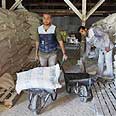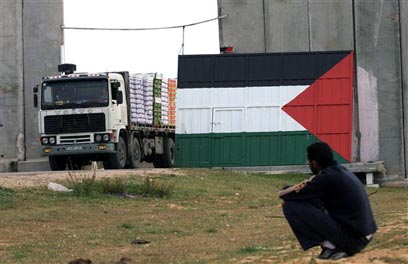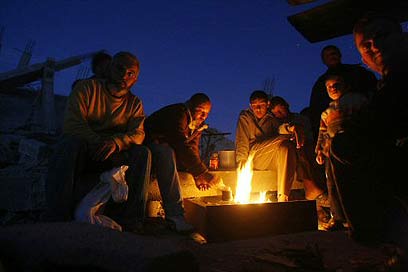
Plan: Ease of restrictions in return for Shalit
Defense establishment forms new recommendations for talks aimed at securing kidnapped soldier's release following international and Egyptian pressure, ongoing smuggling, Obama speech. Ynet obtains full details of plan
The recommendations – some of which have already been approved by the defense minister and will be brought to the political echelon's approval – have been obtained by Ynet and are revealed here for the first time. They include allowing the transfer of coffee, tea, soup and canned food into Gaza, as well as fuel for electricity production.
The full recommendations were submitted at the beginning of the week, and are expected to be approved by Defense Minister Ehud Barak and IDF Chief of Staff Gabi Ashkenazi, who are expected to approve them. Later, the matter will be brought to the approval of Prime Minister Benjamin Netanyahu and the five members of his limited forum, and perhaps even to the National Security Cabinet.
Beyond the aim of securing the kidnapped soldier's release, the ease of restrictions is a response to the increasing international pressure to improve the situation in Gaza, repeated appeals by Egypt, the ongoing smuggling of humanitarian equipment through underground tunnels at the Philadelphi route, and US President Barack Obama's historic speech in Cairo.
The plan is to implement the program in a gradual manner, as the Egyptian-mediated talks for Shalit's release and for a truce between Israel and Hamas progress.

More equipment to enter through crossings (Archive photo: AP)
The lines guiding the recommendations' authors were separating between the humanitarian aid, which may help advance Shalit's release, and rebuilding the Gaza Strip with what is defined as "cement, concrete and iron" – which may help terror organizations improve their military infrastructure.
The upcoming month of Ramadan, which will begin on August 20, also had an effect on the recommendations, as well as "an ongoing threat of diseases and epidemics, which requires sending in products serving as preventive treatment."
Hamas: Do, don't talk
The Hamas movement attempted to lower expectations in response to the plan, saying that it was waiting for the move to be implemented on the ground.
We will only respond when we see the goods reach Gaza with our own eyes, an organization members said, explaining that as far as Hamas was concerned, the defense establishment plan was "an Israeli bluff".
According to Hamas, the list of goods missing in the Strip was much more extensive than what Israel was willing to send in and related to all areas of life: Medications, fuels, oils, calf, cows and meat, rice, flour, plastic products, etc.
The shortage of concrete and iron for rebuilding the Strip following the Israeli offensive will continue to be felt, as Israel has no plans to transfer such goods for fear that they would be used by terror organizations to improve their military infrastructure.
A Hamas source noted that Israel had made similar statement in the past, but that nothing had actually happened on the ground.
Caring for Palestinian protein
The proposed plan details a long least of restrictions which could be eased in accordance with the situation in the Strip following Operation Cast Lead.
In terms of food, the recommendation is to allow international and private organizations to transfer products like coffee, tea, soup powder and canned vegetables, meat, fish and sausage.
In terms of public health, the recommendation is to send into Gaza equipment for purification facilities, and even beehives.
Another recommendation is approving an "ease of reliefs" for the Ramadan fast, including bringing in clothes, shoes and kitchenware.
The political echelon is recommended to continue transferring funds of international organizations to the Red Cross and to the United Nations Relief and Works Agency (UNRWA), as well as allow the payment of salaries to Palestinian Authority workers "as a tool for bolstering the Salam Fayyad government", through a monthly transfer of NIS 50 million ($12.9 million) from banks in the West Banks to banks in Gaza.
Additional recommendations include allowing the entry of 50 workers of the and United Nation and other organizations from east Jerusalem and the West Bank to the Gaza Strip, as well as the approval of international delegations for humanitarian aid.

In terms of "agricultural input", the defense establishment recommends sending into Gaza seeds for the production of potatoes and fertilizers which cannot be used for manufacturing rockets, as well as medications, vaccinations and food for animals.
In terms of "humanitarian products", the recommendation is to bring in hygiene products, detergents which cannot be used by terror activists, cartons and packages, diapers, and donations of international organizations – from tents to mattresses.
In addition, the transfer of spare parts to henhouses and hatcheries is expected to be approved "in order to maintain a continuous supply of protein to the population and reduce the smuggling of these products, which may harm the public's health."
The defense minister was also recommended to allow the entry of chicks in order to rehabilitate the industry of self-egg production, allow the entry of equipment for greenhouses in order to allow self-production of fruit and vegetables and in order to reduce the dependency on Israel, allow the limited entry of equipment for fishing as an important source of protein, and the limited entry of seeds and agriculture equipment in favor of exports Europe later on.
Preparing for tough winter
The defense establishment's recommendations address the next winter as well, in order to deal with the damages of Operation Cast Lead, which will make life in the rain and cold very difficult.
One of the recommendations is to allow the entry of nylon sheets unlimitedly in order to seal the broken windows, as well as transferring raw materials for windows and doors and petrol heaters ahead of the winter. Another recommendation is sending in equipment and material for repairing and renovating UNRWA and Red Cross facilities.
The list includes examining the implementations of elements from the UN plan for renovation of buildings as part of the preparations for the winter – but opposite the PA, so as not to allow Hamas to take credit.
The UN plan for construction projects in Gaza at a total sum of $77 million – of buildings whose construction began before 2007 and was frozen – is also expected to be approved. This project includes a clinic, six schools, four communal centers and 2,400 housing units.
However, the defense establishment recommends rejecting a project for physical rehabilitation of the Strip at a total cost of $831 million, which has been presented to Israel.
And what about the gas and fuel in the Strip? The defense establishment recommends approving the European Union request to handle the situation, and to increase the quota of diesel oil for hearing, in order to allow the production of electricity at about 70 megawatt.
The condition for implementing this recommendation is completing the renovation of the Gaza power station, which is being delayed due to technical difficulties. The recommendations' authors hope that all this will advance the negotiations and bring Gilad Shalit home.
Gilad Shalit was kidnapped into the Gaza Strip 1,104 days ago.
Ali Waked contribute to this report










